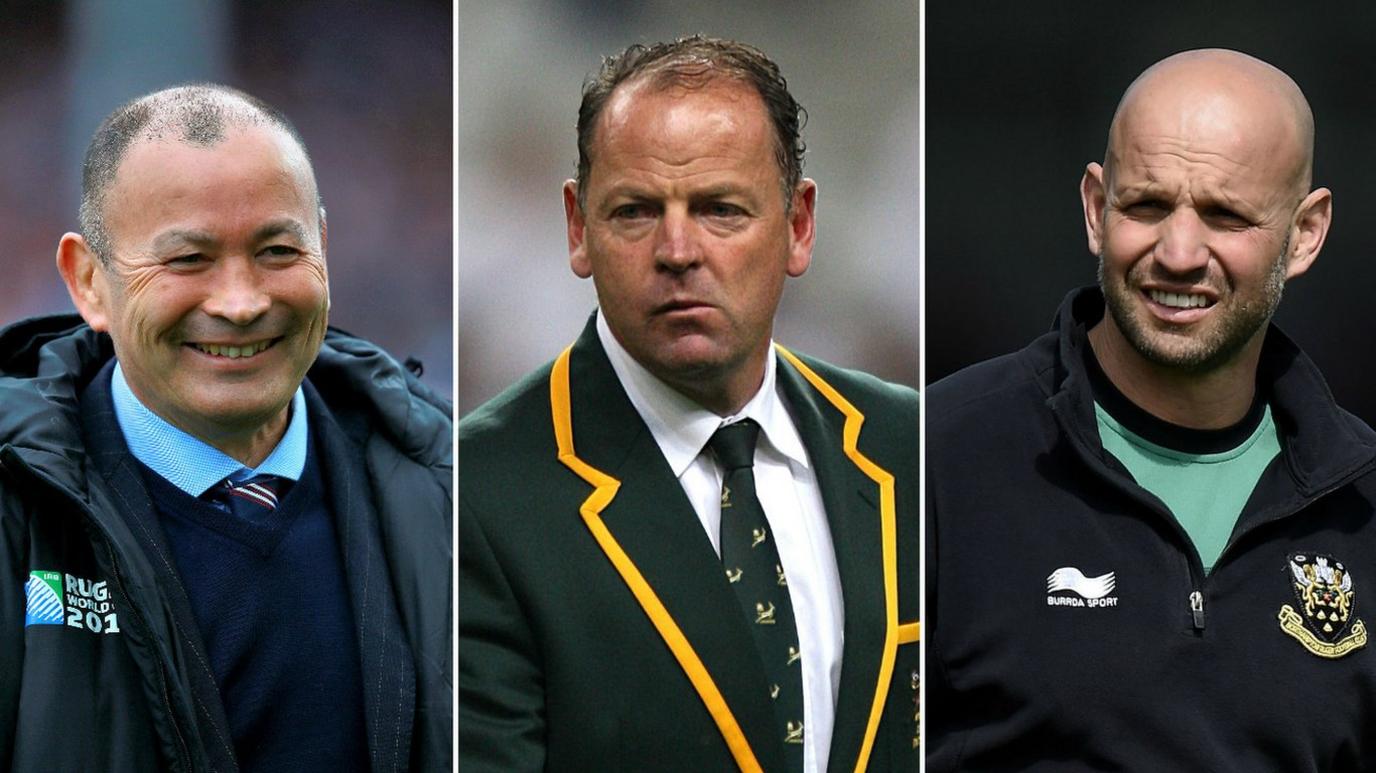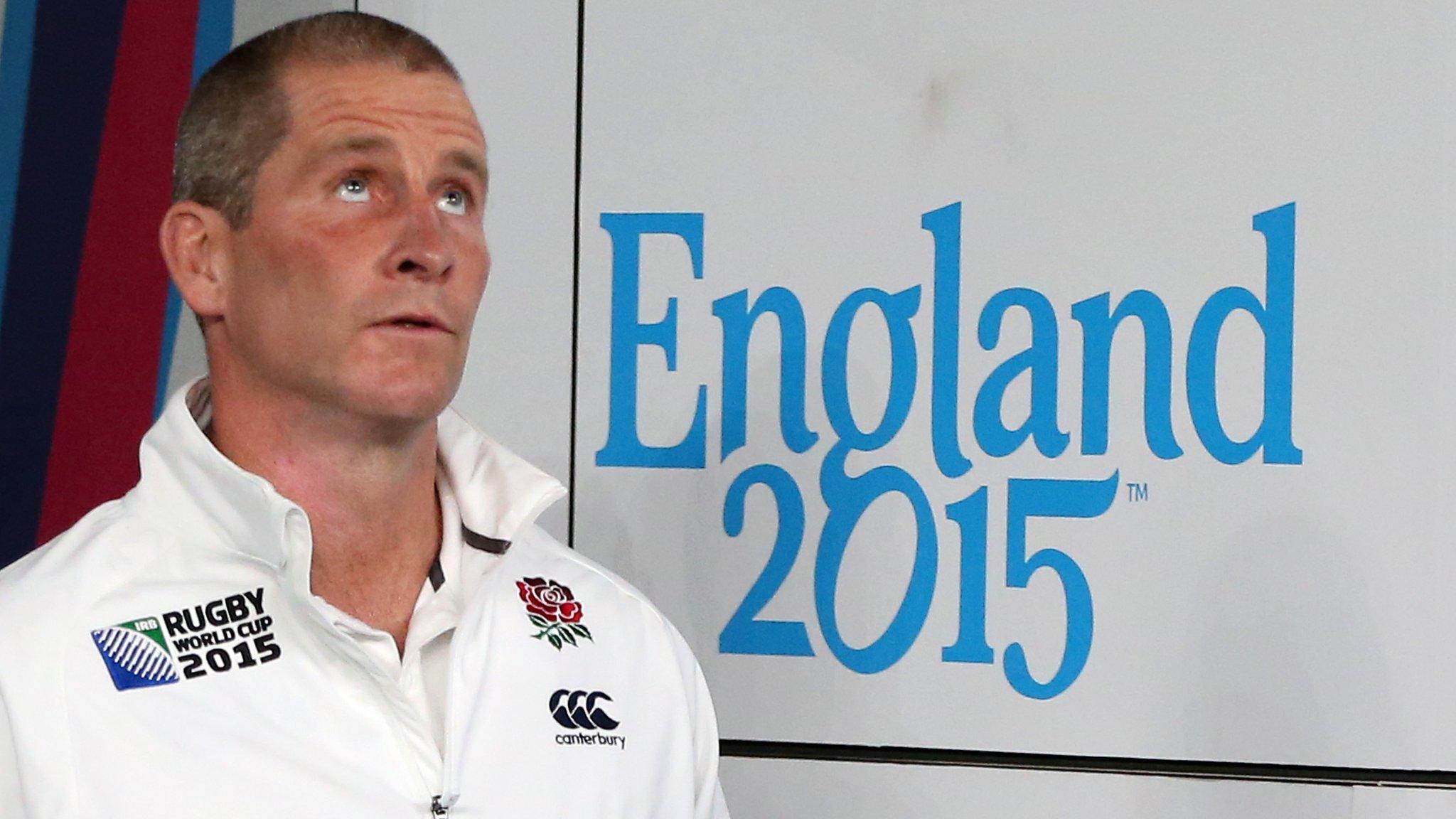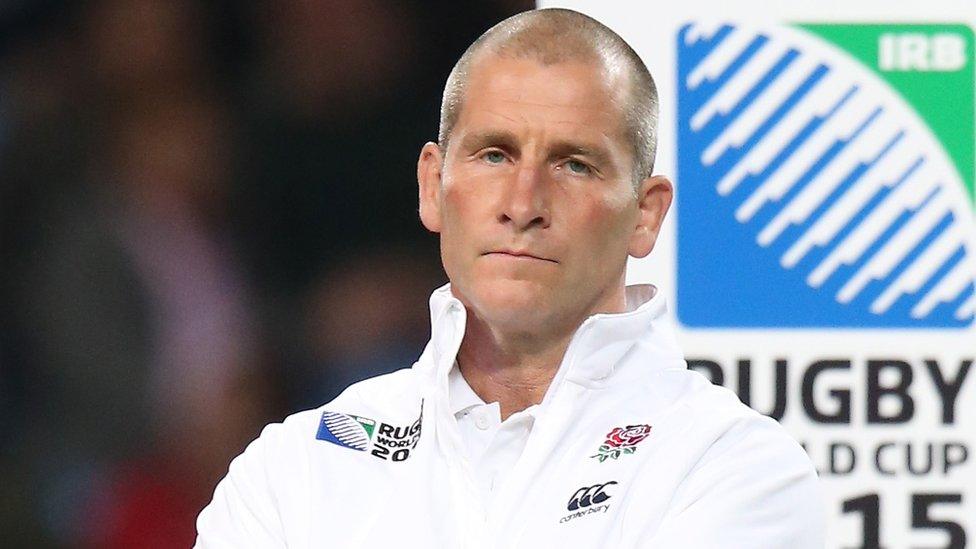Stuart Lancaster: England coach leaves after World Cup failure
- Published
The rise and fall of Stuart Lancaster
Stuart Lancaster has left his post as England coach following the team's early exit from the World Cup.
England became the first sole host nation to be eliminated in the group stage of a World Cup when they lost to Wales and Australia in Pool A.
"I ultimately accept and take responsibility for the team's performance," said Lancaster.
Lancaster, 46, was made permanent coach in 2012 and won 28 of his 46 games, but failed to win the Six Nations.
"I took on the role in difficult circumstances and it has been a huge challenge to transition the team with many hurdles along the way," he added.
"However, I am immensely proud of the development of this team and I know that there is an incredibly strong foundation for them to progress to great things in the future.
"We have played some excellent rugby and it was always going to be tough to get the right level of experience into them in time for 2015. It is a young group of players with the huge majority available for the World Cup in Japan in 2019, where I believe their recent experience will make them genuine contenders."
RFU chief on Lancaster's exit
A review into England's performance at the World Cup took place after the tournament, with Rugby Football Union chief executive Ian Ritchie stating Lancaster agreed he should step down from his role.
''The Rugby World Cup was hugely disappointing for everyone associated with the England team and the subsequent review into the team's performance was always intended to be extremely comprehensive, which it has been," said Ritchie.
England launch 'global' coach hunt
"Following the review, Stuart and I met, where we agreed that he should step down as head coach. This was subsequently ratified by the RFU board."
Reaction to Lancaster's exit
Former England international Andy Goode: "We were all excited pre-World Cup. But it was obviously a failure and, as he said, it was his responsibility. I am not surprised by the decision. It is probably the right one. There are some great coaches in the set-up, who need to be looked at."
Former England and Bath hooker Lee Mears: "I wonder if they could have kept him in the RFU somewhere. You can't waste all that experience. It's very reactive and causes a load of havoc."
2003 World Cup winner Will Greenwood: "I look back on it and I see the style in which Australia and New Zealand play, averaging 65 caps in that final. I just think that the young team were overawed."
Former England player Brian Moore on Twitter:, external "Lancaster takes responsibility for RWC exit and stands down - always knew he was a honourable man."
Former Wales fly-half Jonathan Davies:"I think he was trying to put the right pieces into place but selection unfortunately was his downfall."
Rugby union commentator Ian Robertson on BBC Radio 5 live |
|---|
"England had a desperately disappointing World Cup. Lancaster had lots of highs, but the World Cup was a bitter disappointment for him, the England team and its followers. |
"Name a qualified English coach who could take over and do a better job? I can't name you one. If for the first time ever England go for a foreign coach the obvious answer is Eddie Jones, who took Japan to three wins out of four - including beating South Africa. I can't name one who would be better in England than Stuart Lancaster." |
Key problems?
Inexperienced players - England had the youngest squad in the competition with an average age of 26.2. Each player averaged 25 caps, the second fewest in Pool A. Of Lancaster's first squad of 32, only 12 made it to the World Cup.
Missing senior stars - Prior to the World Cup, Lancaster chose not to pick Manu Tuilagi and Dylan Hartley, external because of on- and off-field offences.
Overlooking overseas - Lancaster stuck to the 'no overseas rule' so he omitted Toulon's 2014 European Player of the Year Steffon Armitage, external and the 2015 award recipient Clermont Auvergne's Nick Abendanon.
Selection - Bath player Sam Burgess, who had only 10 months of union experience and has since returned to rugby league, was picked ahead of Northampton's Luther Burrell who was an ever-present in the last Six Nations campaign. England's management were blamed for fast-tracking him into the squad., external
Opposition - Former RFU chief Martyn Thomas said Lancaster was not the right man for the job, external because of his inexperience of coaching at the top level. Ex-internationals Mark Cueto and Kyran Bracken called for Lancaster to leave his role after the World Cup.
Results - Lancaster won 16 of the 20 Six Nations matches he coached but failed to win the titles. And against the big three southern hemisphere sides he only won three from 15.
What happens next?
There is no word yet from the RFU on the future of Lancaster's coaching team of Andy Farrell, Graham Rowntree and Mike Catt. The full World Cup review will be presented to an RFU board meeting on 17 November.
The search will then begin for a replacement for Lancaster in time for next year's Six Nations, with England opening their campaign away to Scotland on 6 February.
Those linked with the vacant position include Australia's Michael Cheika, former Wallabies and Japan coach Eddie Jones, Wales boss Warren Gatland and Ireland's Joe Schmidt.
- Published11 November 2015
- Published11 November 2015

- Published11 November 2015

- Published11 November 2015

- Published3 February 2017

- Published14 September 2016

- Published15 February 2019
